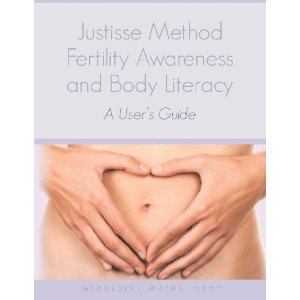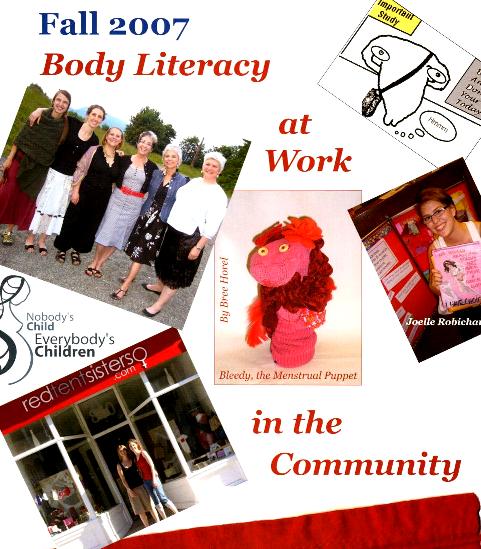Body Literacy. It’s cool to see a phrase I championed infiltrate the language, be taken up and used by others. Not always referenced, but used. And that’s okay by me. I want #bodyliteracy to become a flourishing Twitter hashtag.
 I first used the term in June 2005, just as I arrived at my first Society for Menstrual Cycle Research conference in Boulder, Colorado. A few months later, the origins of this first usage, by myself and colleagues Geraldine Matus and Megan Lalonde, were documented in Femme Fertile, a newsletter published by Justisse Healthworks for Women. I wrote at the time:
I first used the term in June 2005, just as I arrived at my first Society for Menstrual Cycle Research conference in Boulder, Colorado. A few months later, the origins of this first usage, by myself and colleagues Geraldine Matus and Megan Lalonde, were documented in Femme Fertile, a newsletter published by Justisse Healthworks for Women. I wrote at the time:
The concept of body literacy occurred to me after I read a novel illustrating the disempowering impact of illiteracy. The inability to read diminishes self esteem and opportunities to participate in the exchange of ideas. The connection to the lives of girls and women is obvious — the education of girls is a key strategy in all international development work. It struck me that most educated women in developed countries live with another kind of illiteracy — (we) are not taught to“read” or understand (our) own bodies. On the contrary, (we) are taught to distrust (our) bodies and accept various artificial means to“manage” them.
By my definition, body literacy is acquired by learning to observe, chart and interpret our menstrual cycle events. This life skill (as I call it) helps us understand how our sexual, reproductive and general health and well-being are connected to our menstrual cycles. Body literacy supports, if not compels, our fully informed participation in health-care decision making.
 My Femme Fertile colleagues and I continued to write about body literacy, telling personal stories in Stuck in a Body Literacy Gap (Winter 2006) and sharing professional experiences in Body Literacy at Work in the Community. Our presentation at the 2007 SMCR conference was called Menstrual Cycle Charting: A Path to Body Literacy.
My Femme Fertile colleagues and I continued to write about body literacy, telling personal stories in Stuck in a Body Literacy Gap (Winter 2006) and sharing professional experiences in Body Literacy at Work in the Community. Our presentation at the 2007 SMCR conference was called Menstrual Cycle Charting: A Path to Body Literacy.
Since then, the phrase has been spreading thanks to SMCR members. Geraldine Matus, who helped develop the concept, incorporated the phrase in the title when she updated her Justisse Method Fertility Awareness and Body Literacy: A User’s Guide, first published in 1989. Research scientist Annie Harvey uses the phrase in her women’s health work at Via Christi Hospitals in Wichita, Kansas. Jerilynn Prior at the Centre for Menstrual Cycle and Ovulation Research says body literacy is ‘as important as reading, writing and arithmetic!‘ Chris Bobel, associate professor of women’s studies, mentioned body literacy in her book ‘New Blood: Third Wave Feminism and the Politics of Menstruation‘ (2010).
Chris’s mention was noted and used in a Psychology Today blog title by Molly Castelloe, The Last Taboo: Menstruation and Body Literacy. It was re-posted on Tumblr.
A recent Google search found other mentions, one of which predates my use of the phrase. I love that the Tathapi Trust Women and Health Resource Development has been advancing the concept in India since 2000.
Sexuality and Fertility Awareness (FA) education as part of ‘body literacy’ is a core area of Tathapi’s work, involving not only bodily experience of the reproductive system but also the socio-cultural and political experience of women’s health.
The PUKAR Youth Fellowship Program in India has used body literacy in its work with teenage girls, while the Institute for Reproductive Health at Georgetown University has a youth initiative focusing on fertility awareness and body literacy.
Body Literacy: Now in a book title, a fledging hashtag on Twitter and, perhaps, soon to be an Internet meme? I hope so. The word meme, coined by evolutionary biologist and author Richard Dawkins, comes from the Greek word ‘mimeisthai’ meaning to imitate or copy. Please, go for it!


Thank you Laura for taking the time to outline the historical use of the ‘Body Literacy’ meme. It is my hope that it becomes even more common and that the ideas behind become fundamental to our attitude to our bodies.
Yes, thanks Laura. I regret that I did not properly credit you in my own work. I did not know you were the wise innovator! I do know and I am very very grateful to you!
Not to worry. That’s the cool thing about how such a concept spreads. Where it starts doesn’t matter all that much. What matters is that “body literacy” becomes a well-known phrase. You are contributing to this happening. And I obviously didn’t think of it first if the group in India has been talking about body literacy since 2000! I like to imagine the concept seeping through the undergrowth of women’s health knowledge and wisdom until, suddenly, one day we’re all standing knee deep in a pool of body literacy, splashing each other with it. And then there will be no going back to not knowing.
Hear, hear, Geraldine. And your book title is going to help make this happen.
This is the way of emergent phenomena — it does indeed come up from the unconscious realms of our being into the light of consciousness —